Jharkhand: Potable Water, Healthcare a Far Cry, Coalfield Dependents Victim of District Mineral Fund Misuse
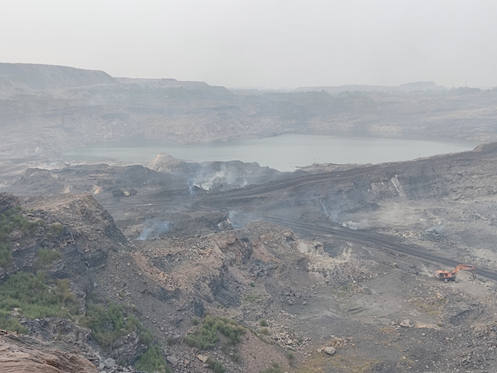
Jenagora Opencast Coal Mine/Jharia
One of India’s largest coalfield, Jharia in the Dhanbad district of Jharkhand is in the lurch despite a dedicated development fund known as District Mineral Foundation Trust (DMFT). Alleged fund misutilisation is reported to have taken place alienating masses from basic amenities. The major negative impacts of mining could be by way of deterioration of water, soil and air quality, reduction in stream flows and depletion of groundwater, congestion and pollution due to mining operations, transportation of minerals, increased burden on existing infrastructure and resources.
Kujama Madhuban Kumhar tola is a rural hamlet bound by the defunct underground coal mine, that is, Kujama colliery, standing 5 kilometres away from Jharia town has 38 mud houses standing on a subsiding prone land. Simmering fire, toxic gases and fumes surround the population. The village despite being eligible for overall development equipped with potable water, health care, education, skill development, women and child welfare, cleanliness and sustainable environment conservation with the usage of funds under DMF, is dwelling in tatters.
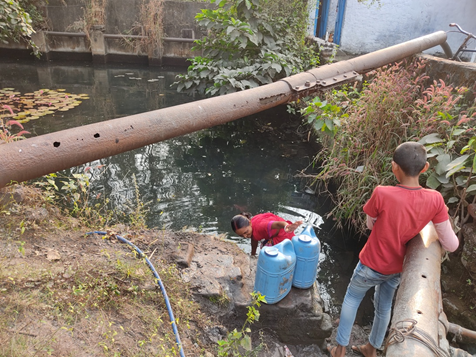
Kujama Kumhar Tola dirty accumulated water
The everyday routine of the village involves filling water from a dirty accumulated area for household chores like washing clothes, utensils, etc. It is the only water collection point for a population of 150. Sarita Devi (40) a coal scavenger fetches water from the accumulated pond-like structure daily for use. It involves boiling the same water for drinking purposes. Two of her sons are helping hand in the everyday routine. Her husband deployed as a contract worker at nearby Rajapur colliery is a patient of asthma. Every household in the village uses the water for consumption and has a minimum of one person suffering from breathing complications that involves tuberculosis, cough and asthma. The nearest destination for resolving intense health complications is Dhanbad, 12 kilometres away. The unavailability of a health centre in a coal bound region raises eyebrows on the DMF funds utilisation.
Dhanbad District Mineral Foundation Trust (DMFT) has more than Rs 1,700 crore dedicated to the overall enhancement and development of the coalfields but on contrary, the population in Jharia and nearby coalfields are aloof about its existence.
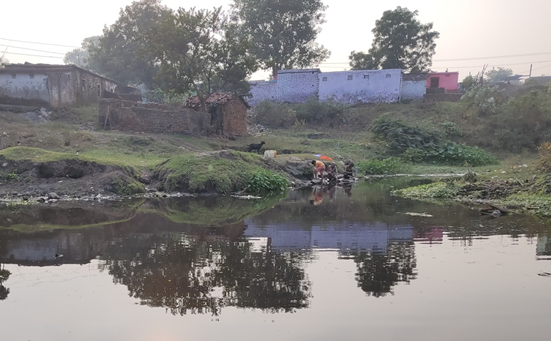
Villagers using pond water in Hameed Nagar
A kilometre away towards north from the defunct Bagdigih coal mine is situated Hameed Nagar hamlet where unclean pond water is being used daily. Living with available untidy resources seems to be the accepted fate. As per the government rule book, in Jharkhand, the Drinking Water and Sanitation Department accounts for around 91% of the total DMFT amount spent.
The Mines and Mineral (Development and Regulation) Act, 1957 (MMDR Act, 1957) was amended through the MMDR Amendment Act, 2015. One of the amendment provisions relates to the introduction of section 9b which provides for the establishment of District Mineral Foundation (DMF) in any district affected by mining-related operations. The objective of the DMF is to work for the interest and benefit of persons, and areas affected by mining-related operations.
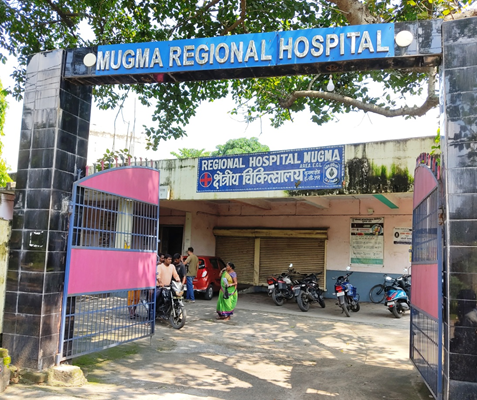
Mugma Regional Hospital
Equipped for only routine check-ups with two doctors and three nurses, the Mugma regional hospital is in no position to cope with any major treatment like TB, asthama. Moreover, during the pandemic, the voluminous inflow of COVID-19 infected people did not receive oxygen. The nearest health care destination is either Dhanbad or Asansol and Durgapur in the neighbouring state of West Bengal. As per medical superintendent Dr Raman Prasad, the Mugma regional hospital caters to a population of 35,000 is 36 kilometres from the Dhanbad district headquarters and is the only option available for immediate medical help for the mining area.
Ganesh Dhar, former ECL employee and head of a Bharat Colliery union affiliated to the Centre of Indian Trade Unions (CITU) in Nirsa block echoed the need of having a dedicated hospital to the coal-dependent population in the state. Enhancing the workforce capacity of Mugma regional hospital is an urgent requirement of locals. The veteran trade union leader alleged no use of DMF funds in Mugma’s development that comprises of two collieries, Kapasada and Mugma.
Surrounding villages close to Kapasada colliery in Mugma too are devoid of rural health centres and no new school has come up in recent years indicating DMF funds penetration as farcical. The Nirsa-Govindpur water pipeline project worth more than a hundred crore is underway which would benefit the urban population and not the coalfield dependents raise questions on fund utilisation.
The accusations of DMF funds misuse reflect in the status of ongoing projects. In the span of five years, 240 schemes got approved under the Dhanbad DMF wherein 111 are complete while 123 remain incomplete and 6 got cancelled. The expenditure worth Rs 1,741 crore include projects namely drinking water, health, sanitation, skill development, environment and physical resources in areas of Tundi, Nirsa, Baliyapur, Maithon. On condition of anonymity, an official of the district administration revealed the number of projects related to the DMF funds.
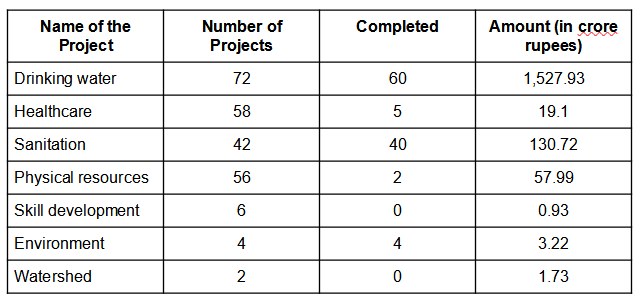
Total expenditure is worth Rs 1,741.62 crore while incomplete projects are 123. For comments, Dhanbad DC was reached out over the phone but there was no response. The mismatch between DMF funds expenditure on various projects and debilitated resources on the ground has led to scrutiny and presently the expense is under audit carried by the auditor general of Jharkhand.
Expenditure of funds under DMF in coalfields of Ranchi district too has emerged as a matter of controversy in the past few weeks. As per government records, Ranchi’s Khalari block comprising 14 panchayats received Rs 107 crore and Rs 47 crore was claimed to have expensed on their development but locals refute the claim as the situation over ground seems deplorable. The health status of villagers in close proximity to colliery is vulnerable without affordable and dedicated health centres.
Health complications in coalfields are predominantly an ignored part of the region. Seldom could a health centre be located in rural areas closely settled to functional coal mines. Shortness in breathing and asthma are the most commonly found ailments across villages. The DMF funds expense also involve environment-related projects that rarely get enacted benefiting people said Dr S Zafarullah, Dhanbad district tuberculosis officer. He claimed that the health among coal region dwellers who in general are deprived of door to door health services was worsening due to the unavailability of rural health centres.
Jharia MLA Purnima Singh while attending the DMFT event in Dhanbad in mid-December revealed her grievances and said that time-bound implementation of schemes supported by the funds under DMF has failed deadlines. So getting it done on time is a gigantic task. Scarcity of CHCs and drinking water are among the top priorities. Meanwhile, Dhanbad legislator Raj Sinha pointed to the recent proposal to purchase road sweeping machines worth Rs 44 lakhs which raises questions on their previous purchase in 2019.
Last year irregularities in the funds under DMF came to the fore when water tankers and sweeping machines were lying unused and subsequently again the fund was used to buy the same which instigated an audit and assessment by the then Dhanbad deputy commissioner Uma Shankar Singh.
The recently published research paper titled - “Understanding Just Transition in Coal-dependent communities” highlights the coal dependence in Jharkhand has drawn researchers to carve out challenges likely to be faced by coalfields. The research categorically mentioned the collection and use of DMF funds to enhance health, education and rural development.
All coal mining and coal power companies pay taxes and royalties to the national, state, and district governments. According to one study, CIL and NTPC (India’s largest power producer) together contribute nearly 3% of the national government’s total annual revenue. In Jharkhand, coal mining taxes and royalties constitute nearly 8% of state government revenue. The data collected under the Right to Information Act revealed that the district administrations in Jharkhand collected nearly 800 crore rupees ($110 million) under the District Mineral Foundation (DMF) in 2020. Moreover, coal companies spent nearly 116 crore rupees ($16 million) through corporate social responsibility (CSR) payments.
The findings were enough to expose the wrongdoings in name of DMF funds expenditure on development.
Dhanbad deputy development commissioner Dashrath Das informed NewsClick that the reason behind the slow pace of DMF funds supported scheme completion is their late approval due to technical reasons. Officers are deputed to carry out the execution at the earliest.
The author is a Bihar-based independent journalist.
Get the latest reports & analysis with people's perspective on Protests, movements & deep analytical videos, discussions of the current affairs in your Telegram app. Subscribe to NewsClick's Telegram channel & get Real-Time updates on stories, as they get published on our website.
























